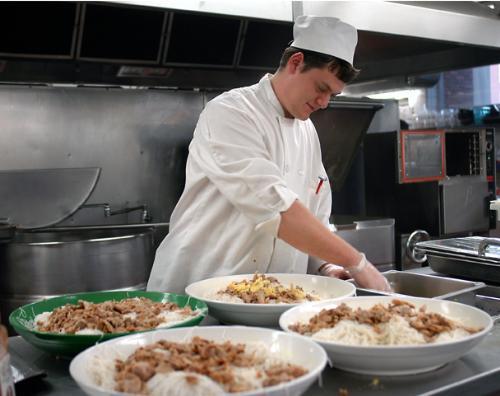
News
Harvard Alumni Email Forwarding Services to Remain Unchanged Despite Student Protest

News
Democracy Center to Close, Leaving Progressive Cambridge Groups Scrambling

News
Harvard Student Government Approves PSC Petition for Referendum on Israel Divestment

News
Cambridge City Manager Yi-An Huang ’05 Elected Co-Chair of Metropolitan Mayors Coalition

News
Cambridge Residents Slam Council Proposal to Delay Bike Lane Construction
HUDS Cooks Up Healthier Fare

If you ask Executive Chef of Residential Dining Martin Breslin what’s cooking, it won’t be pepperoni pizza and frozen fish.
“Now it’s pesto and black olive pizza and freshly-caught native talapia,” he said.
Harvard University Dining Services (HUDS), armed with made-to-order eggs, bean and grain stations, and more than five kinds of locally-grown squash, has declared war against transfatty acids.
They’ve convened an expert panel and even hired a renowned author and vegetarian chef as an outside consultant.
“We took the results of the online surveys and comment cards very seriously,” said HUDS Executive Director Ted Mayer. “[We] responded with more menu changes than we had been accustomed to in the past.”
To provide students with more nutritionally-balanced and varied meal options, Mayer said dining halls will now dish out more seasonal menu items cooked-to-order, as well as more locally-raised produce, meat and fish.
Food selections will also be served on a new seasonal schedule with more squash and harvest vegetables in the fall, stews and meats in the winter, and more fresh fish and salads in the spring.
The Harvard School of Public Health Nutrition Roundtable, a select group of cooks and nutritionists, reviewed many of the new recipes, eliminated oils with transfatty acids from all of Harvard’s fried foods, and brainstormed more vegetarian and vegan options.
Mollie Katzen, renowned vegetarian chef and author of eight cook books, attended meetings of the Roundtable, introducing new recipes and workshops to Harvard’s dining staff over the summer.
Many of Katzen’s recipes will be piloted at Quincy House and the School of Public Health before circulating around campus.
The changes to Harvard’s fare stem from student preference and satisfaction surveys distributed last spring, Mayer said.
The menu changes mark the culmination of nearly a year of the review of campus food options by a team of chefs, cooks and HUDS administrators, who studied student surveys and comment cards as well as the nutritional content and cooking methodology of the menu.
After sifting through its current collection of recipes, HUDS members began developing new recipes, Mayer said.
“More than ever we focused on the nutritional content of the food that’s being prepared, because the data from our surveys showed that that was what was on students’ minds,” Mayer said.
In addition to new food items, which will be served in a four-week cycle, dining halls will be stocked with Belgian waffle irons and George Foreman grills so that fresher and hotter food options are available daily.
Alix McNitt, HUDS director of marketing and communications, said that she attributes many of the menu modifications to better preference and satisfaction surveys.
“We asked open-ended questions to pick up patterns that helped us to design a menu this year that reflects the specific tastes of the community,” McNitt said. “We also determined that a vast majority of students eat a vegetarian entree at least three times a week and that there was room for more vegetarian dishes with mass appeal.”
Despite new and more exotic menu options, some students say Harvard’s food has plenty of room for improvement.
According to Radu Tatucu ’05, satisfaction surveys may not be the best way of collecting data about the menu.
“It seems like there’s more healthy food to choose from, but it’s unrealistic to expect people to spend 15 minutes filling out a survey to give their food preferences,” he said.
“It’s a lot easier to eat healthy this year because there’s so much more variety and sophisticated food selections,” Allison Smith ’06 said.
According to Executive Chef of Residential Dining Martin Breslin, the food will only get healthier.
“Improving food is an evolving process. We need to keep up with current food trends and student requests so that we can make dining fun and exciting,” Breslin said.
—Staff writer Kimberly A. Kicenuik can be reached at kicenuik@fas.harvard.edu.
Want to keep up with breaking news? Subscribe to our email newsletter.
